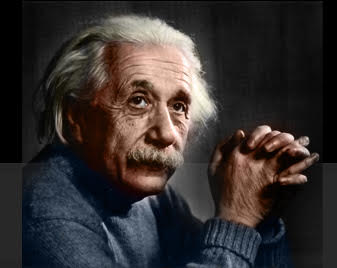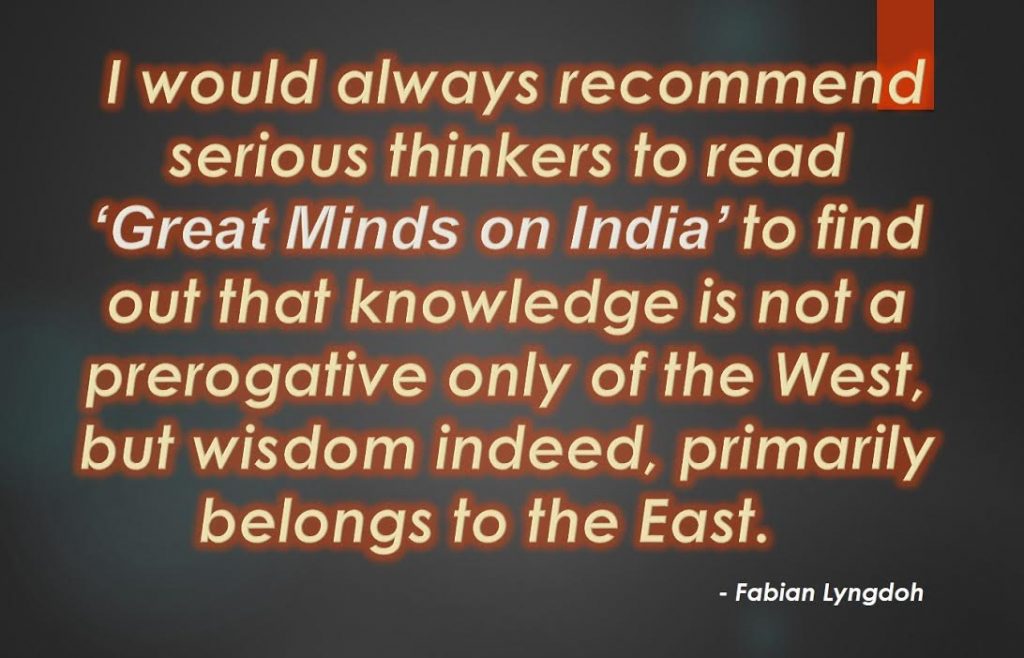A research-based book ‘Great Minds on India’, by Salil Gewali is a laboriously compiled beautiful booklet. In this book the author has compiled the sincere confessions of the great personalities of the world, wherein they admit their indebtedness to the great Indian philosophical and religious traditions; and how the Indian classical stores of knowledge have transformed their thought and understanding of the mystery of reality in its material and phenomenal manifestations, as well as in its spiritual and divine nature. This compilation is outstanding in itself. I really appreciate the labour and sweat that the author has put in his research to bring out this precious little book of wisdom.
This book is an eye-opener to the Indians who have lost interest in anything that is traditionally their own, and believing that everything of value should come from the post-industrial civilization of the West. It would also enlighten the people of the West that many of their great personalities have indeed been greatly influenced by knowledge and wisdom contained in the Indian classics. It is interesting to note that the great physicist, Albert Einstein admits that it was the Indian mathematicians who taught the world the art of counting in the scientific sense of the term. Voltaire says that the great mathematician Pythagoras went from Samos to the Ganga to learn geometry from the Indian sages. Arthur Schopenhauer, the great German philosopher says that the Upanishads are the product of the highest wisdom; and American professor, Arthur Versluis says that the Upanishads provide the purest metaphysics available to us from the primordial past. These great minds arrived to these conclusions because they have come to believe as C.E.M. Joad, the eminent British philosopher, that the Upanishads’ general conclusion, that mystical experience is the pathway to reality; and as the Canadian scholar, Paul William Roberts was convinced that the Vedas see the ultimate truth behind all ephemeral truths.
The world today in the midst of the terror of religious fundamentalism has still more to learn from the Indian religious philosophy. Hinduism, as noted American scholar Linda Johnsen says, is the one world religion that reaches out to embrace other faiths with respect. This, she says is because Hindus believe that absolutely no one is excluded from divine grace. Hinduism as a system of knowledge is what Annie Besant says, a combination of science and religion in perfect harmony. It is at the same time scientific, philosophical and spiritual. What makes Hinduism the most tolerant religion in the world, says George Bernard Shaw is because its one transcendent God includes all possible gods. In fact, Hinduism is so elastic and so subtle that the most profound Methodist, and the crudest idolater, are equally at home with it. Sri Arobindo, the great Indian philosopher and religious teacher testifies to what the western scientists and philosophers are saying, that ‘Hinduism gave itself no name, it sets no sectarian limits; it claimed no universal adhesion, asserted no sole infallible dogma, set up no single narrow path or gate of salvation; it was less a creed or cult than a continuously enlarging tradition of the God-ward endeavor of the human spirit’. That is what Hinduism is – a system of all humanity’s God-ward endeavours, or quests for spirituality.
The world has also benefited much in medical science from the knowledge revealed and stored in the Indian philosophical and religious texts. But the most important contribution of the Indian knowledge system would be, not in the physical science, but in providing the ultimate inductive-leap to reality. As American mythologist, Joseph Cambell admits that ‘Yoga is a technique to link consciousness to the ultimate truth: the mystery of being. The first principle of Indian thought, therefore, is that the ultimate reality is beyond description. It is something that can be experienced only by bringing the mind to a stop; and once experienced; it cannot be described to anyone in terms of the forms of this world. The truth, the ultimate truth is transcendent. It goes past, transcends, all speech, all images, anything that can possibly be said’.
There is in reality, an answer to every human problem. The only problem is that human beings would not find these answers only through intellectual and rational efforts; it also requires spiritual efforts and divine revelations; and these are what the Indian sages of old have achieved. Mr. Gewali himself has hinted in his ‘Acknowledgement’ in, “Great Minds on India” that he pays deep obeisance to ‘the revered sages who, with their supernatural power, thought beyond time and saw beyond the universe’. It is this stand-point from beyond time and beyond the universe that made the sages acquired supernatural power; and it is this supernatural power of the sages that made Indian knowledge system distinct and exceptional in the world. This spiritual methodology of knowledge is still functional and relevant today if strong prejudices and intellectual pride do not stand on the way.
Eminent American physicist, John Archibald Wheeler believes that ‘the thinkers of the East knew it all, and if we could only translate their answers into our language we would have the answers to all our questions’. This is true if man is humble enough to admit that his reason and intellect can only lead him half of the way. Prominent German philosopher, Frederich von Schlegel says that ‘the idealization of reason, as set forth by the Greeks, appears in comparison with the abundant light and vigor of oriental idealism, like a feeble spark in the full flood of the noonday sun’. So, the great Indian sages discovered the truth because they marched ahead, in the light of faith when reason has consumed its oil.
I thank Mr. Salil Gewali for his little book that stirred up my mind to engage in more thought and contemplation. I am amazed by the appreciations the author received from India and abroad for the precious work he has done, while the community where he lives may not be aware of it at all. I would propose that we must learn to appreciate a person not only by the academic qualifications, or the economic or political position that he or she is standing in society, but by the product of his or her labour whether physical or intellectual. We are accustomed to believe that real knowledge and truth can be found only in books written by Europeans or Americans; and we are apt to quote every possible sentence we can find therein to justify our own contention, whether right or wrong. So, I appreciate Mr. Gewali’s effort all the more not only because it has been appreciated by people from abroad but because he is also a permanent resident of Mawprem, Shillong (India), close in our midst.
It is also an honour for the State of Meghalaya (India) that the book published from this state has been well-received across the world and has been translated into ten languages such as Hindi, Tamil, Telugu, Gujarati, Marathi, Kannada, Malayalam Bengali, Manipuri and Nepali; and, an eminent NASA scientist as its the Chief Editor. Another pride of this book is that a world-acclaimed NASA Chief Scientist Dr. Kamlesh Lulla of Houston has voluntarily prefaced this title. I would always recommend serious thinkers to read the book to find out that knowledge is not a prerogative only of the West, but wisdom indeed, primarily belongs to the East.









